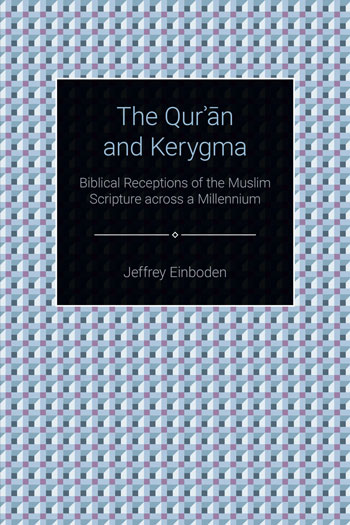Author
Jeffrey Einboden is Professor of 19th-century American Literature and Comparative Literature at Northern Illinois University, and author of Nineteenth-Century U.S. Literature in Middle Eastern Languages (Edinburgh University Press 2013); Islam and Romanticism: Muslim Currents from Goethe to Emerson (Oneworld 2014); and The Islamic Lineage of American Literary Culture (Oxford University Press, 2016). His research into Islamic sources and the Western canon has appeared in journals including Milton Quarterly, Translation and Literature, Middle Eastern Literatures, and the Journal of Qur’anic Studies; in 2006, his “The Genesis of Weltliteratur: Goethe’s West-östlicher Divan and Kerygmatic Pluralism” (Literature and Theology; 2005) was named by OUP as one of the “100 seminal articles” published by Oxford Journals in the past century.
Presentation

The Qur’ān’s biblical foregrounds have long formed a controversial concern within Qur’ānic Studies, with field-leading scholars debating the Muslim scripture’s complex relationship and “response” to the Judeo-Christian canon. This contentious subject has largely overshadowed, however, a reciprocal, yet no less rich, textual relationship which forms the focus of the present study. Rather than read the Muslim scripture in light of its biblical antecedents, The Qur’ān & Kerygma adopts the inverse approach, situating the Qur’ān as itself the formative foreground to pivotal acts of biblical translation, composition and commentary. The book argues, in particular, that Qur’ānic receptions have provoked and paralleled key readings and renditions of the Bible, enriching acts of creative authorship and interpretation that have contoured the legacy and language of Judeo-Christian “kerygma”.
Structured chronologically, the study’s span of more than a millennium is sustained by case studies selected from representative areas and eras, exploring innovative adaptations and translations of Qur’ānic diction undertaken by biblical authors from 9th-century Andalucía to 20th-century North America. Mirroring its subject matter, the book engages a literary critical approach, offering close-readings of targeted texts frequently neglected and never before synthesized in a single study, highlighting the stylistic, as well as spiritual, influence on exegetes of the Bible exercised by Islamic writ.
Contents
Preliminaries
Introduction
Chapter 1
From al-Fātiḥah to Hallelujah: The Qur’ānic Psalter of Ḥafṣ al-Qūṭī
Chapter 2
“Verily have I Found Allāh Oft-Returning”: The Qur’ānic Poetics of Sulaimān al-Ghazzī
Chapter 3
“The Religion of the Messiah in Multitudes”: Echoes of the Qur’ān across Christian Schisms
Chapter 4
“Adheres to the Arabic Idiom”: Ludovico Marracci’s Qur’ānic Vulgates
Chapter 5
“By Origin and Language an Hebrew”: The Genesis of a Judaic Qur’ān
Chapter 6
A “Totally Typological” Christian Qur’ān: Northrop Frye’s Triple Mirror
End Matter
Coda to The Qur’ān & Kerygma: “Synthesis of the Word”
